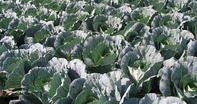
Propagation
From seeds.Planting Method
Direct sowing can be done as well as planting seedlings. The land should be cleaned and ploughed deeply to a depth of 450 to 600 mm about a month before planting, the soil should be fumigated for nematodes before planting time if necessary.
About 50% of the nutrient requirement will also be applied just before planting and ploughed in with a disk to clean level and prepare for planting.
Spacing
For large head cultivars plants should be spaced 400mm apart in rows that are 700mm apart. This equates to about 40 000 to 50 000 plants per hectare.
For medium head cultivars plants should be spaced 300mm apart in rows that are 500mm apart. This equates to about 60 000 to 65 000 plants per hectare.
Sowing Time
Sow in seed trays indoors (greenhouse) any time throughout the year.Planting Time
Planting of seedlings takes place about 30 days after sowing when seedlings are about 100mm tall. Cabbage can be planted throughout the year in South Africa except in areas that experience intense cold or very warm periods.Growth Period
100 to 120 days from plantingFertilization
To ascertain nutrient requirements a soil analysis should be done. Cabbage is a heavy feeder and combining normal fertilizer with manure and/or compost will give good results. Organic fertilisers can also be used.
A general recommendation: Before planting, disc plough in a minimum of 1000kg of 2:3:4 (27) to ensure the plants get a good start. Then apply top dressings of nitrogen on the plant rows.
Two weeks after planting – 250 kg LAN per hectare Four Weeks after planting – 350kg LAN per hectare Six weeks after planting – 500kg LAN per hectare Do not fertilize too late as this could cause splitting or deformed heads.
Irrigation
Irrigate seedlings once a day during the cooler months and twice a day during warmer months until they are ready to be planted out. Irrigate and moisten area to be planted so that seedlings can be planted into moist ground.
Once planted immediately irrigate so that plants can settle into their new environment. Thereafter irrigate between 30 and 40mm of water per week depending on temperature and soil type.
By Louise Brodie